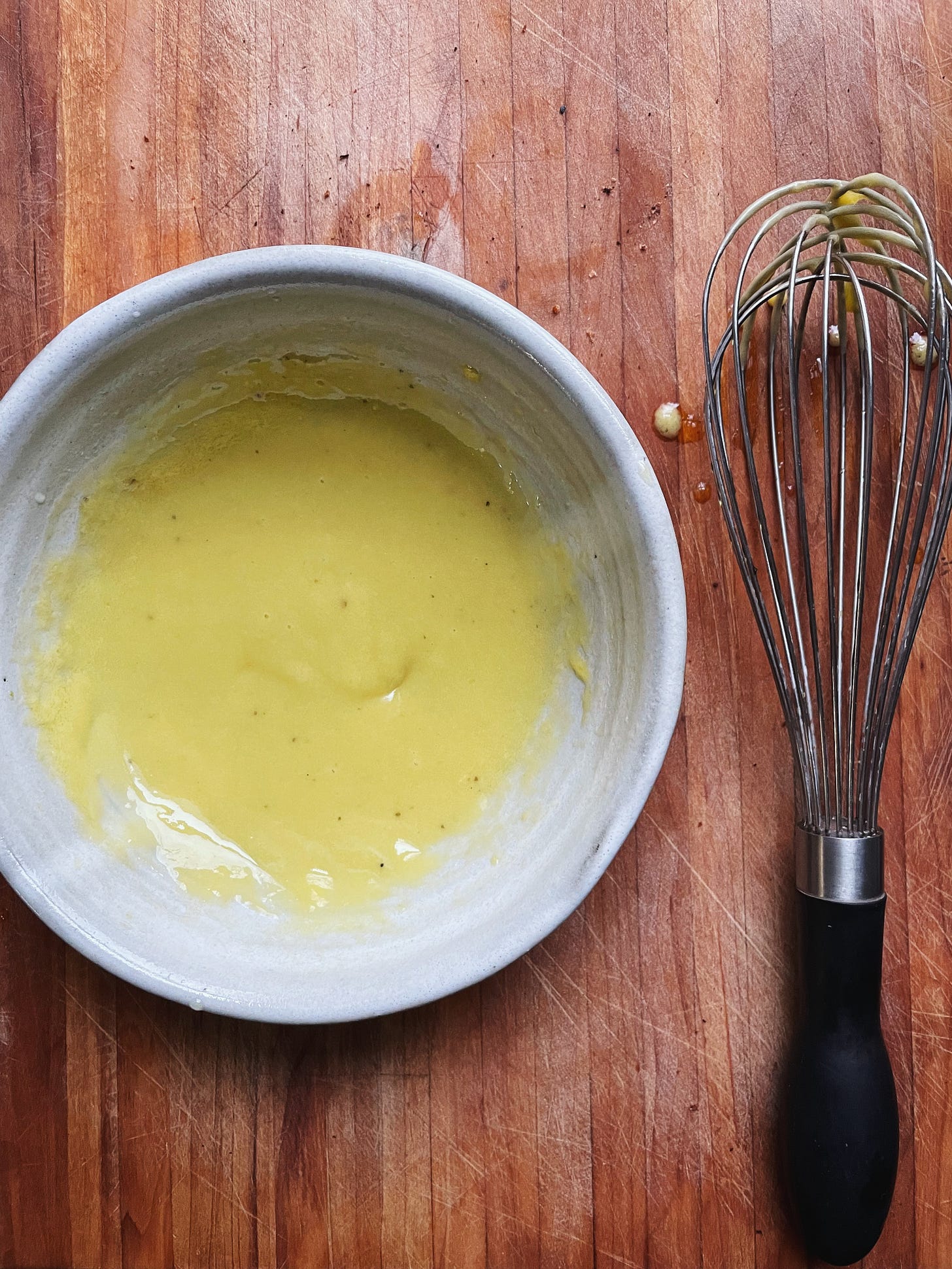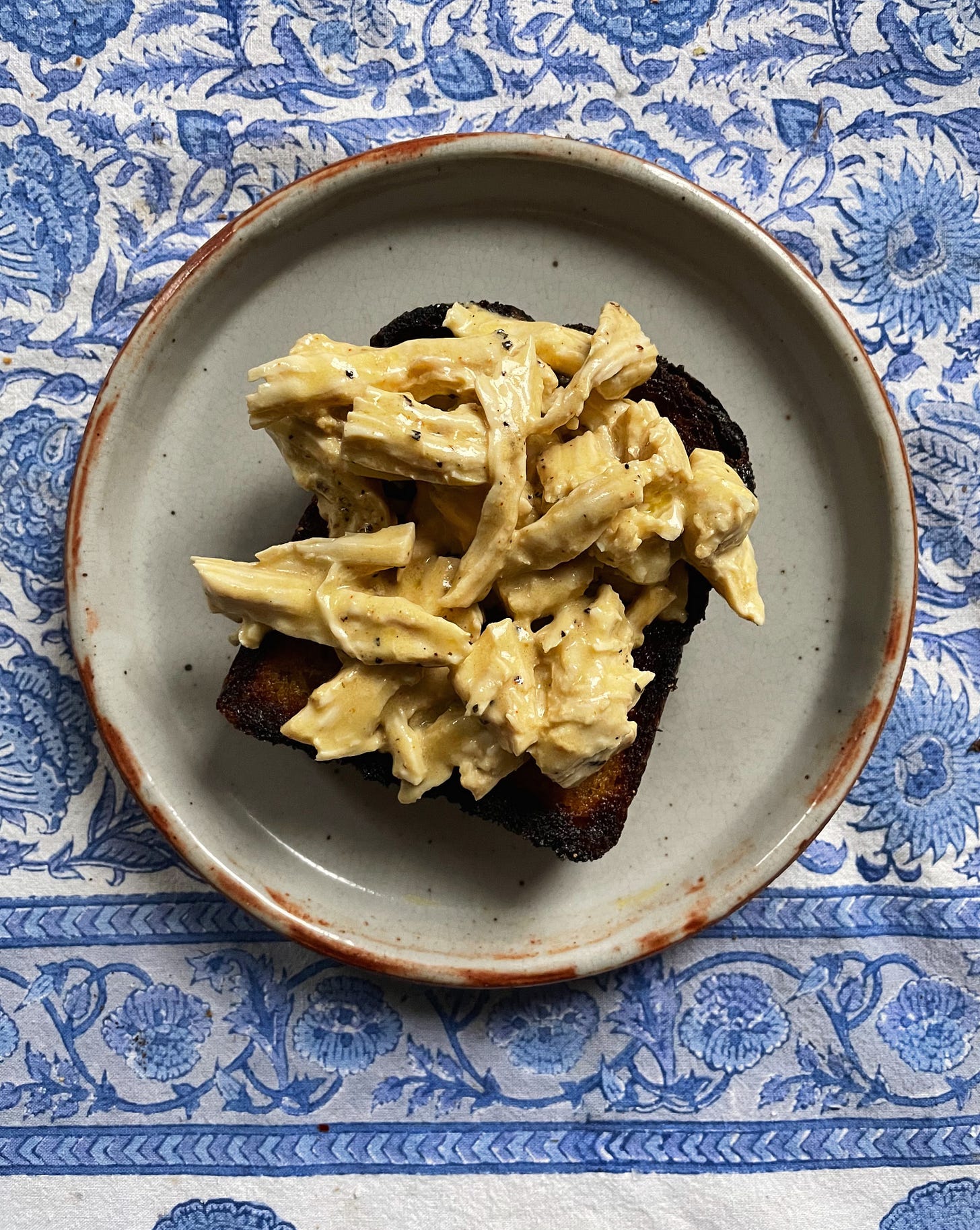how to get out of a rut, part I
aioli
You have been in a cooking rut: mediocrity has crept into your kitchen like a bad smell. You have been “busy”, you have been “preoccupied”, you have been “despondent”. You are empty of novel ideas, and you are making subsistence food. Egg on bread, egg on rice, chicken quesadilla, instant ramen with whatever, Perfect Bar, yogurt bowl, smoothie, yogurt bowl, cheez-its, in a fugue state you purchased frozen mozzarella sticks at the store but you don’t even have anything to dip them in.
You remember how much you dislike starting the dinner process when it is already dark. It shrinks the room, like removing a mirror. The other night you made a conceptually confused chicken cutlet—somehow too much breading and too much salt. As always you did not stop to think, you just bumbled your way through it. You wanted to come up with some elegant celery root mash recipe and then it came out like soulless glump. You showered everything with hot sauce left over from your friend’s cousin’s bar mitzvah. The leftover mash stares at you from the refrigerator’s top shelf. You worry the smell is coming back.
Still there is the problem of lunch. You have shredded chicken breast in the fridge and half a loaf of good bread on the table. When you bought five pounds of celery root at the farmers market you braved the line for a polenta pullman. You did not brave the line for dosa, but one day you will. You are out of mayonnaise, though the scraped jar remains in the fridge.
A spark of an idea glimmers and all of a sudden you are making aioli. You mostly do it for the sake of using your body. You are desperate to extract labor from yourself that is not transmitted through a screen. You are desperate to force a slow process. You wonder when was the last time you used the whisk. You imagine the type of woman who makes herself a petit aioli. You have kissed her but that was not enough for a complete transference; your nature remained unchanged. A monochromatic lunch will have to do.
Whisking gets a bad rap: the analog toil of whipped cream, polenta, aioli. (The waspy masochism of Amanda’s brother whipping cream with a fork!) But it forces you to pay attention. You watch the bowl and you are reminded of your body. You separate the egg (wet and cool) with your fingers, drop the yolk into the bowl Kyle made you, grate in half a garlic clove, shake in some smoked salt from a very very very old plastic jar. You begin to whisk, you fill a capful of oil, you drip it in, and watch the yolk swallow it up. The process is working. You keep adding and whisking and adding and whisking, you watch the yellow mass pull away from itself and join back together, you watch it go from cadmium to easter-pastel, it becomes thick and then it slackens, you switch to the squeeze bottle of olive oil. You wonder when people began calling this difficult. You remember that pimentón aioli that broke once and ruined your day. Someone else had to fix it. Aioli is fragile but it is not complicated. You just whisk and whisk and whisk until it looks like something you want. You are making aioli because you want to make something very small that requires patience. You want to pour significance into something insignificant. You also want chicken salad.
You slice a fat piece of bread and fry it in oil. It sizzles and turns dark golden and threatens to burn but does not. It drips when you fork it out of the pan. You like to bolster a chicken breast with plenty of fat. You let the bread rest like a steak, you remember this advice from the Turkey and the Wolf Cookbook. While it cools you mix a few spoonfuls of aioli into a bowl of chicken, torn into thick shreds. It is not dry because you read in Sohla’s book that it’s best to poach chicken at almost even below a simmer. You pulled it at the right time. You add a splash of sherry vinegar (nectar of some kind god), kashmiri chili powder, more salt. You have not let yourself put music on the radio or a podcast in your ears. You think about Charlotte’s practice of eating without distraction. You are allowing yourself a shred of quiet. You pretend it is not difficult. You pile the chicken onto the bread, you get the box of Maldon, this is your lunch and you’ll salt it as you like. The crunch of the bread’s dark face yields to a pudding-y middle. The other day you thought perhaps I am just the sort of person who eats fried toast every day. Chicken salad is not a new idea. But you can’t remember the last time you made aioli. It is a reminder that ideas continue to lurk inside your stomach.
Eventually you will open a cookbook again, but today you will settle for an emulsion. You think of a line from Rebecca May Johnson: “I have written down what I have been doing in the kitchen because it is what I have been doing.” You interpolate that old Didion quote: I don’t know what I think until I cook it.




This is really elegantly written. I always enjoy your writing and I know exactly the feeling you describe- a kind of listless kitchen malaise that makes you wonder, who WAS that person who so optimistically bought parsnips, Brussels sprouts on the stalk, three kinds of pears and an unfamiliar cheese at the market last week? as you force yourself to cobble together a cheese quesadilla.
But the joy comes back, it always does. The chicken salad looks scrumptious.
Also: toast your bread DARK